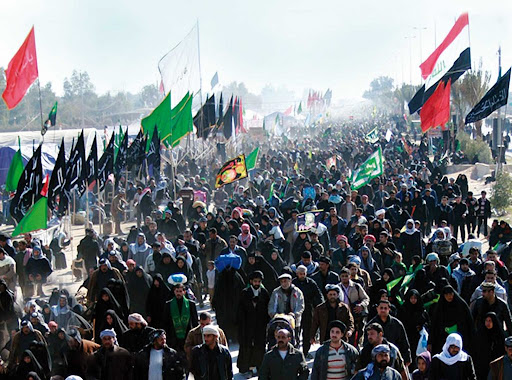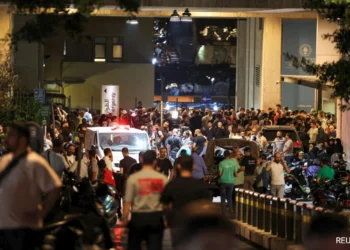Human Lives Human Rights: During Saddam’s nearly three-decade reign, he banned all mourning ceremonies for the Ahl al-Bayt (PBUH), a suppression that had a lasting impact on the Shia community. However, after the fall of Saddam’s regime, the pent-up emotions and desires of the past decades were finally released, and the Shia presence in the Two Holy Mosques and the Arbaeen pilgrimage became a prominent and magnificent phenomenon.
Today, the Arbaeen ceremony is a testament to the active involvement of Muslims from Iraq and other Islamic countries. In 2009 and 2010, an estimated 10-14 million pilgrims converged on the shrine of Imam Hussain (AS), a staggering number that underscores the significance of this event. According to various statistics, the 2013 Arbaeen pilgrimage ceremony drew an astonishing 20 million people, making it the largest human gathering in the world. Moreover, every year, thousands of followers from other religions, including Christianity, join in the procession and mourning ceremonies to commemorate the death of Hussein.
While the annual Hajj Congress attracts millions of Muslims, with a peak attendance of around 4 million, the Arbaeen pilgrimage has taken its place as the largest human gathering in the world. The stark contrast between these two events is exemplified by the fact that Hajj pilgrims typically walk only 20 kilometers, whereas Iraqi Shiites from cities like Basra, Nasiriyah, and Numaniyah travel up to 400 kilometers to reach Najaf Ashraf. Moreover, millions of mourners from around the world converge on Najaf Ashraf, walking approximately 80 kilometers to reach Karbala Ma’ali before proceeding to Karbala on the day of Arbaeen.
In this way, the Shiites’ journey to Karbala during Arbaeen is reminiscent of Hussein’s own Hajj, with their Sa’i between Safa and Marwa serving as a symbolic representation of their mourning. The most direct route to Karbala on foot is from Najaf Ashraf, which lies approximately 90 kilometers away. However, some pilgrims from Basra and other cities in southern and northern Iraq opt for a more arduous journey, walking all the way to Karbala.
Escalation of Takfiri Suicide Attacks in Iraq during Arbaeen
In recent years, the Iraqi government has taken unprecedented measures to ensure the safety of the Arbaeen mourning ceremony, deploying tens of thousands of Iraqi police, army, and security services to provide security for the Hosseini pilgrims. Despite these efforts, Takfiri terrorists continue to wreak havoc on the occasion, threatening to destroy the very fabric of Shi’ite unity.
In 2013, for example, Abu Bakr al-Baghdadi, the leader of Iraqi Takfiri groups, issued a chilling threat to kill Hosseini’s Arbaeen pilgrims. In an audio file, he declared: “The presence of Shiites in Arbaeen has been growing for several years. We will take action this year with all our strength and, like Ashura 61 Hijri, we will kill all the Shiites! “Hussein’s pilgrimage in Arbaeen has become a symbol of Shi’ite unity and solidarity, and we must strike a devastating blow to this unity.
As a result of these threats, in 2013, a terrorist wearing an Iraqi police uniform detonated an explosive device in Basra, killing 20 Hussein pilgrims, including women and children. Dozens were injured in the attack. In the same year, three terrorist attacks on Hussein’s pilgrims in southern Baghdad resulted in 36 fatalities and over 100 injuries. In another attack in western Baghdad, five members of a family were killed. The total number of martyrs from the terrorist explosion reached 53 people. Additionally, a terrorist detonated his explosive belt near a food and water distribution tent among pilgrims heading to Karbala. The Iraqi Ministry of Interior reported that 20 people were killed and 40 others injured when a terrorist’s explosive belt detonated among pilgrims in the Al-Dura area, south of Baghdad. Other attacks occurred in Yusufiya, Latifiya, and Baquba, resulting in multiple fatalities and injuries.
Mortar Attack on Arbaeen Pilgrims in Baghdad
According to reports from Al-Mayadeen news channel, a mortar attack on Arbaeen mourners in the south of Baghdad has resulted in the deaths of 2 people and injuries to 7 others. The attack occurred in the Al-Latifiyah area of Baghdad, where pilgrims were gathering to head to Karbala. An Iraqi police source confirmed that three mortar shells struck the area in the early hours of the morning.
Separately, Al-Mayadeen network reported that Iraqi security forces have discovered a large quantity of Grad missiles and their launch pads, which were allegedly intended to be used to attack the city of Karbala during the Arbaeen mourning days.
In another incident, a source from the Central News Unit, quoted by Al-Frat News Agency, reported that terrorists attacked Arbaeen Hosseini pilgrims in the Al-Jadeedah area of Baghdad, using several hand grenades. The attack resulted in the deaths of 3 pilgrims and injuries to 7 others.
Al Jazeera also reported that a suicide bombing in the north of Baghdad had resulted in the deaths of 20 people.
Last year’s Arbaeen ceremony ended in tragedy, with 41 people killed and 144 others injured in Karbala. The governor of Karbala reported that a mortar shell landed just three kilometers from the eastern entrance of the city, resulting in additional casualties. The governor blamed al-Qaeda and supporters of the dissolved Baath party for the attacks.
In another incident, 12 people, including six women, were killed and 12 others injured when a bus carrying Arbaeen pilgrims was attacked in Tal Afar, a city located in northern Iraq.
Iraqi Prime Minister Nouri al-Maliki praised the large turnout of pilgrims at the Arbaeen ceremony, stating that it had defeated plans to create chaos and disrupt security and stability in the country. Maliki considered the massive presence of Shia pilgrims as a significant blow to Takfiris, Baathists, and supporters of tribalism in Iraq. He noted that the pilgrims’ journey to Karbala, despite traveling long distances on foot, was a testament to their commitment to democratic values such as freedom, security, and stability.

















